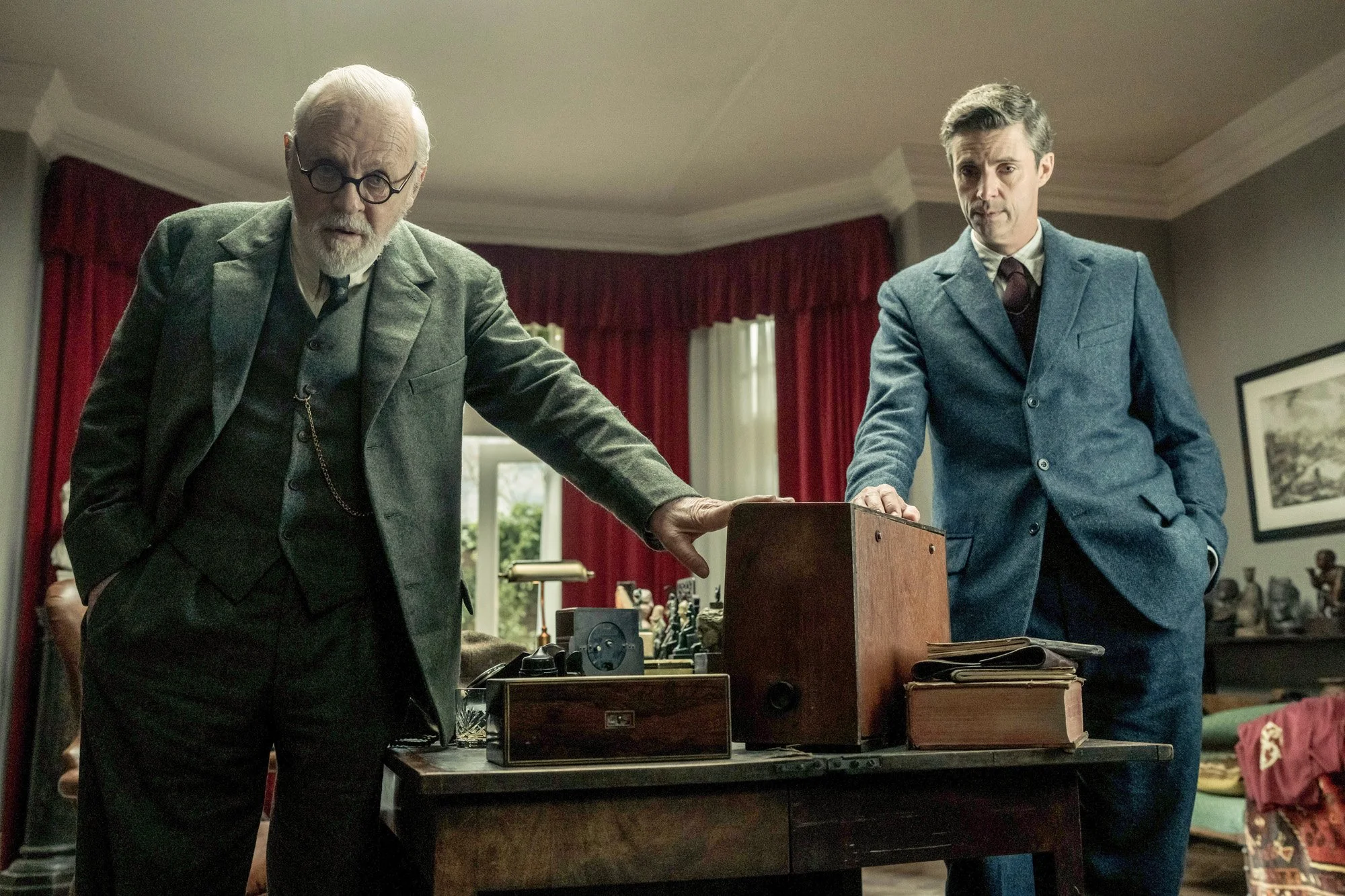Freud's NEXT Session
MARK ST. GERMAIN DISCUSSES THE FILM ADAPTATION OF HIS PLAY, FREUD’S LAST SESSION, STARRING TWO-TIME OSCAR® WINNER ANTHONY HOPKINS
By Joshua Sherman, M.D.
On DECEMBER 22, the film adaptation of Freud's Last Session by Mark St. Germain will be released. Starring Academy Award®-winning actor Anthony Hopkins and Matthew Goode, the movie offers an introspective journey into a pivotal encounter between two intellectual giants: Sigmund Freud and C.S. Lewis. Over the course of an intense conversation, they debate the existence of God and are forced to reckon with their fears, insecurities, and underlying psychological issues. The film’s screenplay is by St. Germain and Matthew Brown, the film’s director. It will be initially released by Sony Pictures Classics at select theaters in New York and Los Angeles, with an expansion to follow in January.
Over the past several decades, St. Germain has established a strong relationship with the Berkshires theatrical community through his continued partnership with Barrington Stage Company in Pittsfield. Barrington Stage has hosted the first productions of many of his most beloved plays, including Freud’s Last Session (2009), The Best of Enemies (2011), Scott and Hem in the Garden of Allah (2013), Dancing Lessons (2017), Dr. Ruth, All the Way (2017), and The Happiest Man on Earth (2023). The recently renovated 132-seat St. Germain Stage was dedicated in honor of his artistic impact.
From his Berkshire home in Sheffield, St. Germain reflects on the creative journey of Freud’s Last Session—from the play's initial inspirations to its cinematic incarnation. His observations highlight how the film adaptation breathes new life into the dialogue between Freud and Lewis.
Anthony Hopkins as Sigmund Freud and Matthew Goode as C.S. Lewis in the film Freud's Last Session.
It's thrilling to hear about Freud’s Last Session becoming a film, especially with Anthony Hopkins on board in the leading role of Dr. Sigmund Freud. What initially compelled you to make a play out of this meeting between Freud and Lewis? It seemed like such a terrific matchup, because you had two of the brightest men of the 20th century meeting face-to-face, and their views on God were diametrically opposed. It would be difficult to find two people who would give a better argument for their own beliefs than those two. That seemed inherently dramatic to me. While writing it, I could move from one to the other, and I didn't really have to take a side because I could understand both sides. It was a satisfying project from the very beginning, and the research process was fun. They were both brilliant writers, and it was it was easy to take words from their books and their letters and incorporate them into the dialogue.
When did you start writing the script, and how did it evolve into what it has become today? I started writing the play about two years before it came to Barrington Stage in 2009. Even after it had a successful run there, it was a challenge to bring it to New York. A lot of producers said, “Why would anybody want to see a play that's talking about God when they can go see a musical comedy?” Still, because it was different, it succeeded. And it ran for a couple years. At that point, I thought I should take a shot at doing a screenplay, so I did, and it initially went unnoticed. There was a producer named Alan Grayson who came to dinner at my house years later. I told him about the screenplay, and he was interested, so I sent it to him. After that, he sent it to the director, Matthew Brown. It took several years to get it put together, and the script went pretty underground for almost a year. I was about to allow a company in California to film it as a play, but I got the call on the very day I was about to sign off on that from Matthew Brown. He told me he had gotten a call from Anthony Hopkins. We were both amazed. When Anthony Hopkins said, “I want to do it,” it really got things going.
Many playwrights envision specific actors while developing their characters. Did you have such visions while writing, and did Anthony Hopkins' involvement alter the language or presentation in the film adaptation?
When I was writing the play, I did not have any particular actors in mind. Once the play was cast, and the two original actors, Martin Rayner and Mark H. Dold, played it for years, they became pretty fixed in my mind. The tone of Freud did not change at all with Anthony Hopkins, and I never let myself dream about that. Of course, he would have been at the top of the list. But I was absolutely shocked when I got the word that he called up and said he wanted to do the movie. It was really out of the blue. It wasn't something that I was waiting for.
What was your experience like working with Anthony Hopkins and Matthew Goode? In the role, Hopkins is playing Freud as an old man, somewhat feeble, sick, and two months away from committing suicide. When I was just watching them do scenes from a distance, I didn't know if Hopkins had aged to that degree, or what was the reality there. When he came up to me afterwards, he was the exact opposite. It was like talking to a jolly 50-year-old man who was very much in very good shape. He's very sharp, and we had a nice conversation. It turned out that the studio they were filming at in Dublin was the studio that he did his first movie in, which was The Lion in Winter. With Goode, all
I had was a short conversation with him when everybody broke for lunch. I had heard wonderful things about him and his performance in The Offer, and he was a good partner for Hopkins as C.S. Lewis. I was really only involved with the film as an observer for a short period of time, and I think that was the best thing for me to be.
Film is a director's medium, and I wouldn't want to be looking over the director's shoulder. I had already been in touch with the director about what I felt was important in the script. I didn't see the dailies, but I was assured by the producers that the two performances were extraordinary. I'm excited to see the film like everyone else, and I’m looking forward to seeing my script come to life in a new medium.
The play is primarily a two-person dialogue, but there are other elements— like an off-stage dog, overhead planes, and Freud’s daughter via phone call. Does the film adaptation introduce us to these characters, and how did you navigate this expansion of the world in your transition to film? The film allows the world to open up significantly. The onset of WWII, the bombing scare, and other elements are brought directly into the narrative. Characters and situations merely discussed or implied in the play, like Lewis’ motorcycle ride or his relationship with his father, can now be depicted on screen. That provides a richer, deeper context, allowing the dialogue to focus more intensely on the interactions between Freud and Lewis.
Although Freud and Lewis are engaged in an incredibly serious and intense conversation, humor appears to be a defense mechanism for both of them throughout the play. The play manages to keep the debates between them witty —and even funny. How did that aspect of the play transition into the film? The tone essentially remained intact. I deemed it crucial for the audience to feel comfortable enough to laugh, preventing the feeling of being plunged into an academic debate. The film follows a similar introductory route as the play does, albeit with some slight adjustments for a visual medium.
Do you find that you personally use humor as a defense mechanism? Quite possibly. Humor often facilitates serious conversations by putting people at ease. My son, who is a stand-up comedian, might attest to that, even though I don’t share his comedic talent.
In both the play and the film, Freud has a complex relationship with music. Could you talk about Freud’s relation to music as presented in your works? Was that founded on research—or a creative addition on your part? It wasn't a fabrication. Freud did engage more with music in his youth, but that faded over time. I think it underscored his suspicion towards emotion. Unless it could be quantified, he was reluctant to engage with it. This became an underlying theme through the progression of his character— both in the play and in the film adaptation.
There's a poignant statement in their conversation, "Death is as unfair as life," particularly in Freud's reflections on personal loss. Does this resonate with your own beliefs? Do you think death and life both harbor inherent unfairness? In a way, yes. Both life and death introduce unexpected— and often undeserved—challenges that we can't control, which highlights their unpredictability and unfairness.
Much has changed in the time since you first wrote the play and now. Has time changed your perspective on whose side you take in the debate – Freud, the atheist; or Lewis, the believer? I don’t think anyone truly knows whether Freud or Lewis has the right answer—if either of them do. I hate to be evasive, but in terms of my own beliefs, the most I can say is that I do not believe in organized religion. Still, in the play, C.S. Lewis says that if you believe in God, your view of God is going to evolve over the years. The way I see it, it’s just not possible to have the same kind of faith or understanding for your entire life. That, to me, is the best part of the play: It leads to those types of deep, evolving conversations. From the moment that Freud’s Last Session first premiered, I would hear audiences leaving the theater and arguing about the very things that Freud and Lewis were arguing about. You can't ask for more than that when you're a playwright. You want the play to continue after the curtain comes down, and I hope that will be true with the film, too.


